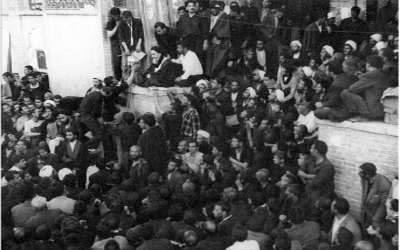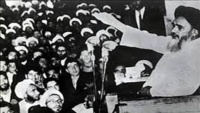Khordad 15 Uprising that changed the destiny of Iran

In the Name of God, the All-Merciful, the All-Compassionate__Salaam everybody and today on the historic 5th of June, the 52nd anniversary of the Khordad 15 Uprising that changed the destiny of Iran, we present you an exclusive feature. In the famous encyclopedia of hadith, titled “Bihar al-Anwaar”, and compiled some three-and-a-half centuries ago by the celebrated Iranian scholar, Allamah Mohammad Baqer Majlisi, one comes across an interesting statement from Imam Musa Kazem (PuH), the 7th Infallible Heir of Prophet Mohammad (blessings of God upon him and his progeny). The wordings of this hadith are:
“A man from Qom will rise and invite people towards truth. Around him will gather people like slabs of iron (of iron-resolve), who will stand firm against strong winds and storms, and will never get tired of war. They know not fear and have trust in Allah. The outcome is for the pious.”
A study of this statement expressed over a millennium and two centuries ago by an Infallible Imam, shows that no such event had occurred in the Iranian city of Qom throughout all these centuries until the year 1963 when a venerable jurisprudent raised his voice against the Godless Pahlavi regime that was installed by the British and backed to the hilt by the Americans in order to keep the Muslim nation of Iran in thrall. True to the words of this hadith, if the despots and the hegemonic powers quaked at the uprising of this man of God from Qom and put him under detention, the seekers of truth responded to his call and launched the Khordad 15 Uprising on June 5 to defend him like slabs of iron. This was Seyyed Ruhollah Musavi Khomeini, who was incidentally a descendant of Imam Musa Kazem (PuH), and had reached the status of ijtehad, earning the title “Ayatollah”, because of his erudite learning, wisdom and prudence that covered political developments as well.
To begin with, the political acumen of Ayatollah Khomeini (God bless his soul), who later in life would be granted by a grateful nation the honorific title of “Imam” or Leader that should not be confused with the divinely-designated 12 Infallible Imams of the Prophet’s Household, came to the fore in 1943. This was the year when he wrote his famous work “Kashf al-Asrar”, shortly after the removal from power of the unlettered tyrant Reza Khan Pahlavi from the Peacock Throne. This budding theologian and jurisprudent clearly saw that the Pahlaví dictator’s mortgaging of national prestige and natural resources to foreigners, his repression of the Iranian people and their traditional values, his forced unveiling of women in the name of progress and civilization, were all part of an elaborate plot conceived by world imperialism to eliminate Islam as a social and political force. He wrote: “All the orders issued by the bandit Reza Khan have no value. The laws passed by his parliament must be erased. All the idiotic words that have proceeded from the brain of that illiterate soldier are rotten and it is only the law of God that will remain and resist the ravages of time.”
The book could be called the start of a mission which would begin to bear fruits twenty years later. In the meantime, after the British replaced Reza Khan with his son Mohammad Reza in 1941, Àyatollah Khomeini maintained his upright opposition to the upstart Pahlavis. Throughout the 1950s, he led a quiet life of study, contemplation and teaching that would reflect on his future greatness. Things, however, took a sudden change in 1963, when Mohammad Reza Shah emboldened by the death of the leading marja’ or Source of Emulation of the time, Grand Ayatollah Seyyed Hussain Boroujerdí, launched his so-called white revolution, which was no more than a whitewash to conceal his destruction of the country’s socio-religious infrastructure in order to make Iran totally dependent on the US. Imam Khomeini sensed the danger. He warned the nation against the sinister plot.
Matters were now moving towards a showdown, and when the ulema forbade the festivities of Nowrouz or New Year Day that year because the martyrdom anniversary of the Prophet’s 6th Infallible Heir, Imam Ja’far Sadeq (PuH), happened to fall on March 22, the ungodly Shah felt enraged and ordered his infamous attack on Madrasa-e Fayziyyeh in the holy city of Qom the very same day, which resulted in the killing and wounding of several ulema and religious students. Things moved at a rapid pace and on June 3, 1963, which happened to be the Day of Ashura, that is, Moharram 10, the martyrdom anniversary of the Prophet’s grandson Imam Husain (PuH) in Karbala, Ayatollah Khomeini delivered his famous speech in Qom which sent shook the Peacock Throne in Tehran. He compared the Shah’s oppression of the people to the persecution of the Prophet’s family, the Baní Hashem by the Omayyad regime, and bluntly told the Pahlavi potentate that the nation would throw him out if he continued his anti-Islamic measures in the service of the US and the illegal Zionist entity called Israel. The Shah ordered his security police to arrest the Ayatollah, an incident which sparked the 15th of Khordad Uprising. He was detained for two months and upon his release he called on the people to boycott the mock elections to be held by the regime in October 1963. He was imprisoned again and held until May 1964. In October 1964, when the Shah signed the bill which came to be known as the ‘Bill of Capitulation’, since it exempted American citizens from facing any legal measures even if they were to violate Iranian laws, Imam Khomeini expressed his strong opposition to this humility of the nation, saying:
“If the dog of an American was to bite the Shah, the latter will have no recourse except in an American court of justice perhaps.”
He was immediately arrested by the regime and exiled to Bursa in Turkey, from where he soon moved to Iraq to take up abode in the blessed sanctuary of Najaf, near the holy shrine of the Commander of the Faithful, the Prophet’s First Divinely-Designated Successor, Imam Ali ibn Abi Taleb (PuH). Here, the innate qualities of faith and resistance in this great Aref or Gnostic definitely got a new veneer and made him so absorbed in the path of the Prophet’s Ahl al-Bayt that he considered the martyrdom of his elder son Ayatollah Seyyed Mustafa Khomeini in 1977 in Iraq at the hands of the Shah’s dreaded secret service SAVAK, as a matter decreed by Allah. Imam Khomeini thus offered his own personal sacrifice to the cause of the Islamic Revolution. Earlier in April 1967, he had written a strongly worded open letter to the Shah’s Prime Minister, Amír Abbas Hoveida, warning him that one day he would be held accountable for his treason to the nation. In 1971 Imam Khomeini denounced the wasteful expenditure of the commoner-turned-Shah for celebrating the so-called 2500 years of monarchy in Iran. It is sufficient to say that from his sojourn in holy Najaf, he ably directed the rising tide of the Islamic Revolution which first lapped Qom in January 1978 after the publishing of an insulting article by the regime against him in the Daily Ettela’aat, and then engulfed all Iran. The rest is history. The events that followed including his triumphant return to Iran on February 1, 1979 to usher in the rule of genuine Mohammadan Shari’ah and the ten years that he was at the helm of affairs of the Islamic Republic defeating every conceivable plot of the superpowers, especially that of Washington, are well documented and too vivid in our memory to be repeated in this brief radio programme. Thus, the 15th of Khordad that occurred 52 years ago was one of the major events in the history of Iran and the world that not only changed the destiny of Iran but continues to have far-reaching political, cultural, and religious impacts on the region and beyond. As could be evinced by reflecting on the wording of the hadith from Imam Musa Kazem (PuH), the seekers of truth continued to rally around him with iron resolve, braving the 8-year war imposed by the US through Saddam in the 1980s, thereby ensuring that the dynamic Islamic Republic system founded by him, would continue, Insha Allah, until the reappearance of the Promised Saviour of mankind, the Prophet’s 12th and Last Infallible Heir, Imam Mahdi (PuH) to usher in the global government of peace, prosperity and justice. Amen








